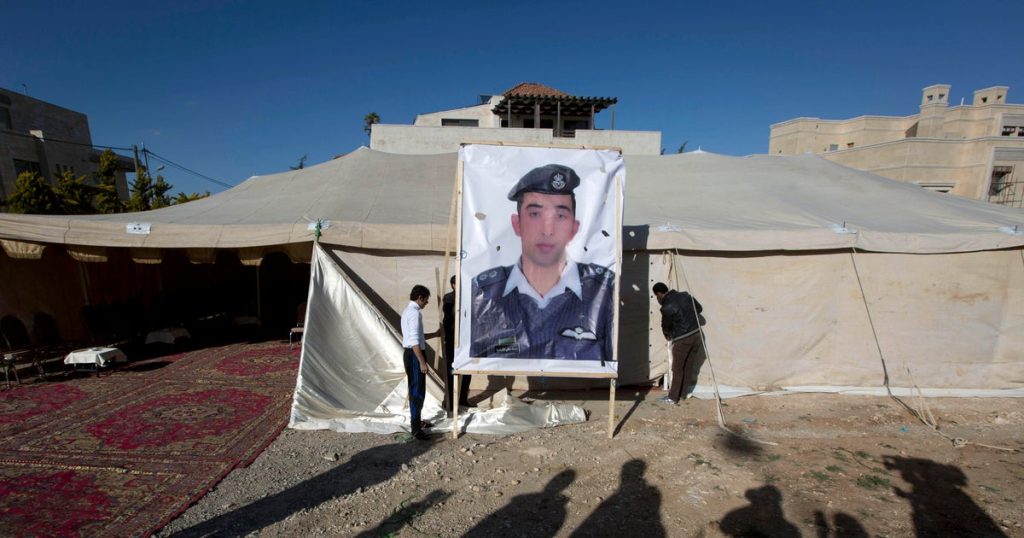A 32-year-old Swedish man, identified as Osama Krayem, has been indicted for his connection to the brutal execution of Jordanian pilot Mu’ath al-Kaseasbeh, whose plane crashed in Syria on Christmas Eve in 2014. The indictment comes as part of ongoing efforts by prosecutors to hold ISIS affiliates accountable for their actions. Krayem, who travelled to Syria to fight for ISIS, is scheduled to stand trial in Stockholm on June 4.
| Article Subheadings |
|---|
| 1) Circumstances of the Pilot’s Capture |
| 2) Details of the Execution |
| 3) Previous Convictions of Krayem |
| 4) Background and Radicalization of Krayem |
| 5) Broader Impact of ISIS Actions |
Circumstances of the Pilot’s Capture
On December 24, 2014, 1st Lt. Mu’ath al-Kaseasbeh was flying an F-16 fighter jet as part of the U.S.-led coalition’s efforts against ISIS in Syria when his aircraft went down. The incident occurred near Raqqa, a city that had become the de facto capital of the extremist group. Shortly after the crash, al-Kaseasbeh was captured by ISIS fighters. This event marked a significant escalation in the conflict, as he was the first known foreign military pilot to be captured since the onset of operations led by the coalition. The situation was particularly sensitive for Jordan, a key ally of the United States, as the pilot’s fate was manipulated by ISIS to exert pressure on the Jordanian government to withdraw from the coalition.
Details of the Execution
In a gruesome display of brutality, the execution of al-Kaseasbeh was captured on video and released by ISIS in early 2015. The 20-minute footage showed the pilot exhibiting signs of beatings, including visible injuries. Prosecutors revealed that Krayem was one of the masked fighters seen in the video, where the pilot was locked inside a cage and set on fire, resulting in his horrific death. This particular execution was unprecedented in its horrific nature and served as a propaganda tool for ISIS, showcasing their capacity for brutality in a calculated manner. It led to widespread outrage in Jordan and sparked protests against ISIS, with calls for revenge against the group.
Previous Convictions of Krayem
Aside from the recent indictment in Sweden, Krayem has faced legal challenges in other European countries as well. He was previously convicted in France and Brussels for participating in a series of ISIS attacks, including the horrific events in Paris in 2015, which led to the deaths of 130 individuals. A special terrorism court in Paris sentenced him to 30 years in prison for charges including complicity to terrorist murder. Furthermore, he has received a life sentence from a Belgian court related to the 2016 Brussels bombings that killed 32 people. These indictments illustrate not only his extensive criminal background but also the international collaborative efforts to address the threat posed by ISIS and its affiliates.
Background and Radicalization of Krayem
Born and raised in Rosengard, a district in Sweden with high crime and unemployment rates, Krayem was identified as a troubled individual even before his radicalization. Numerous reports indicate that he had been in contact with local police due to various criminal activities. Experts have pointed out that he was an ideal candidate for radicalization, as he lacked direction and purpose in life, which ultimately culminated in his joining ISIS in Syria in 2014. Photos he posted on social media displayed him holding an assault rifle in front of the notorious black flag of the group, solidifying his commitment to their cause.
Broader Impact of ISIS Actions
The actions of ISIS, including the execution of Mu’ath al-Kaseasbeh, have had profound implications on global perceptions of terrorism. At its peak, ISIS controlled territory the size of the United Kingdom and was notorious for their barbarism. They committed numerous war crimes, targeting not only those outside their ideology but also Sunni Muslims whom they deemed heretics. Their violent campaigns led to the deaths and suffering of countless individuals since their rise. Although the territorial control of ISIS has drastically diminished following significant military operations, its sleeper cells continue to pose threats in Iraq, Syria, and globally. The psychological and political ramifications of their acts serve to remind the world of the ongoing challenges faced in combating extremist ideologies.
| No. | Key Points |
|---|---|
| 1 | Osama Krayem has been indicted for the execution of Jordanian pilot Mu’ath al-Kaseasbeh. |
| 2 | The execution was characterized by extreme brutality and filmed for propaganda purposes. |
| 3 | Krayem has previous convictions for terrorism-related charges in France and Belgium. |
| 4 | His background shows he was a prime target for radicalization due to social influences in Sweden. |
| 5 | The international community continues to face threats from ISIS, despite territorial losses. |
Summary
The indictment of Osama Krayem exemplifies the ongoing battle against terrorism and the importance of holding individuals accountable for their actions. The shocking execution of Mu’ath al-Kaseasbeh remains a stark reminder of ISIS’s brutal tactics and the psychological warfare that accompanies such acts. As legal proceedings continue, the case sheds light on both the personal stories of those involved and the broader implications of extremist violence.
Frequently Asked Questions
Question: What was the significance of Mu’ath al-Kaseasbeh’s capture?
His capture was significant as it highlighted the risks faced by foreign military operatives involved in combating ISIS and showcased the brutal methods employed by the group against those who oppose them.
Question: What future legal actions are expected for Krayem?
Krayem is set to go on trial in Sweden for his alleged role in the execution, and following that, he is expected to return to France to continue serving his previous sentences for other terrorism-related offenses.
Question: How has the international community responded to ISIS actions?
The international community has responded through multi-national military coalitions, legal actions against affiliates, and ongoing vigilance to combat the ideology and prevent future acts of terrorism.
